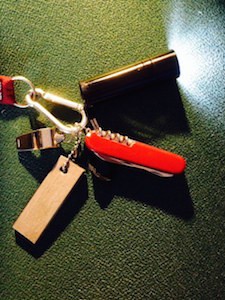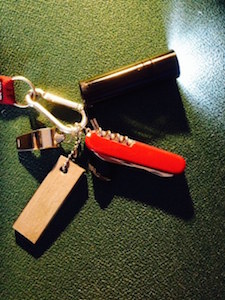You may not feel that your office building is at risk from a terrorist attack. Maybe it isn’t. Chances are, if it is, you already know about it and are prepared. But your workplace may be at risk from other things. There are lunatics amongst us who might have issues with what your company does, or a disgruntled ex-employee with a grudge to settle. Or there may be a fire. Or a non-terrorist explosion in the boiler room. Or a chemical tanker spill. Or a flood. Without trying to whip up panic, remember it is ALWAYS better to have a plan for the worst-case scenario.
We all assume that “they” will have emergency plans. If you work for a large company there is almost certainly a disaster plan in place. But one thing to remember about disaster plans is that they usually hand responsibility for your life over to someone else. If you would rather retain that responsibility, here are some tips for taking control of your own safety.
Carry: Mini-compass, miniature flashlight
Keep in desk: Builder’s dust mask, first aid kit, spare (flat) shoes, leather or gardening gloves, old-style hard-wired phone, important phone numbers, battery powered radio, flashlight and spare batteries, bottle of water.
Pre-plan your escape…
Be sure you know another way out of the building in case your first choice is blocked.
Also make sure you know where all the emergency exits are and that you know their compass directions. Visibility may be poor during your emergency. You may be disoriented. You may not be able to take a right at the water cooler because it and the wall it was against may not be there any more. But you can always head west if you know where it is. If there is sun shining through a wall or window, and you know what time it is, you can work out which direction you are headed.

It’s a good idea to have a miniature flashlight and a mini compass with you at all times. These are available from drugstores, office supplies stores, and toy stores. Nowadays, flashlights come as flat as a credit card, but that beam of light may be enough to attract attention or lead you out of a destroyed building. Compasses come as small as earrings. They’re a popular key chain item. It’s easier for men to carry these items as their clothes have more pockets. Women need to think things out differently; maybe these micro items could clip to a security lanyard around your neck.
…and your office
Bolt tall bookcases or display cases to wall studs and protect breakable objects by securing them to a stand or a shelf using hook-and-loop fasteners. Move large objects that could fall and break or injure someone to lower shelves. Install latches to keep drawers and cabinets from opening and dumping their contents. (Child-safe products are designed to be both safe and used regularly and will be less irritating on a day-to-day basis.) Firmly attach framed pictures and mirrors to walls.
It is a good idea to have a hard-wired telephone available if your office building will support it. Older, smaller buildings probably do. New buildings will have phone jacks somewhere; make sure you know where they are. If the power goes out you may find it the only way of communicating with the outside as your switchboard may go down and the cellular telephone network may be overwhelmed or damaged during an emergency.
What to do
Take cover under a desk or table if things are falling. Move away from file cabinets, bookshelves or other things that might fall, and face away from windows and glass. Move away from exterior walls. Determine if you should stay put, “shelter-in-place”, or get away. Put on flat shoes and tough gloves if you have time. They will help you to step over or move fallen masonry.
The company might issue instructions through the PA system. Listen to them. Try and assess whether they know more than you do. Remember that the World Trade Center announcements urged people to remain in their offices. Had they known more about the situation they wouldn’t have done that. If you hear the emergency services issue instructions through a bullhorn, do what they say, they should have a better idea of what’s going on and what’s the best thing to do.
Wear your dust mask. It won’t be any use against biological agents but it will help if there is structural damage as it will keep the large dust and cement particles from clogging your nasal passages and lungs. It also means your hands are free as you won’t have to hold a cloth to your nose.
Do not use elevators. Stay to the right while going down stairwells to allow emergency workers to come up. Do not panic – ever.
There’s a good office emergency kit here.

